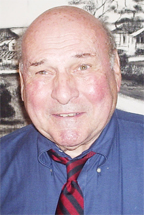A free flow of reliable information is important to any democracy since information is the lifeblood of a democracy, veteran US political journalist James Dickenson asserted.
Dickenson was at the time addressing a small number of journalists at the Hotel Tower at a US Embassy-sponsored forum which is part of a US State Department initiative that has seen him visiting a number of countries. From Guyana, following a public forum today, Dickenson will travel to Suriname to address journalists in that country.

Yesterday’s forum, though poorly attended, facilitated a lively and beneficial interaction between Dickenson and the journalists present during which he acknowledged that reporters in the US work under better conditions and had it far easier than their peers in other countries such as Guyana.
The journalist, who covered every US presidential campaign from 1964 to 1988, stated that the reason behind China rivalling the US to become the superpower of the world is because of its inability to control the flow of information which has increased with technology such as the internet. That flow of information, he indicated, is strengthening the people and the economy.
According to Dickenson, journalists are extremely important to any society and in fact have a great deal of power in any democratic society.
With that being said, he also noted that journalists have the responsibility to provide people with reliable information that can assist them in their everyday life while stressing that the information given must be what people can trust.
Meanwhile, Dickenson noted that covering politics is never an easy task as government officials are often time not cooperative and would want to control the flow of information to their advantage.
“It is a difficult and complicated process as you have to get information from people who don’t want to give or who want to distort it,” he said in reference to political reporting. But while it may be difficult and demanding it is a challenge that any journalist should want to take on and that is one of the reasons Dickenson says he always encourages bright young people to join the profession in the US.
He described political reporting as a “never-ending unrelenting process” and said journalists must keep themselves informed on the political scene in their country and further afield.
He said politicians should be treated with scepticism as “they have to prove themselves; we don’t have to prove ourselves to them.” He warned that journalists should be careful of competing officials who would want to push information to their advantage and as such in reporting the journalists must ensure they get a well-rounded picture. Journalists are also warned that even though they may feel strongly about an issue they should not push their agenda in their reporting and they must always ensure that fact checking is done.
“Maintain your professionalism, you are not there to be pushing any point of view,” Dickenson warned while adding what journalists should want to do is to inform their readers and viewers as clearly as possible so they can get the right information to make their decisions.
He advised that a column is the place journalists could give their opinions but said it is not a path he would encourage practising journalists to take.
Following his presentation, the discussion centred on the issues local journalists have to face especially against the backdrop of reporting in a small population, which sometimes sees journalists and their entities being identified and berated for reporting an issue that may be true but not to the liking of the administration.
Dickenson was a political reporter, editor and columnist for the Washington Post, the National Observer and United Press International for nearly 30 years. He covered the White House during the administrations of Lyndon Johnson, Richard Nixon, Gerald Ford, Jimmy Carter and Ronald Reagan. Dickenson also has covered the Senate and the House of Representatives and their major election campaigns, plus major gubernatorial, mayoral and other political and non-political stories around the United States. He now works as a media consultant with federal government agencies and private corporations while continuing freelance writing.
